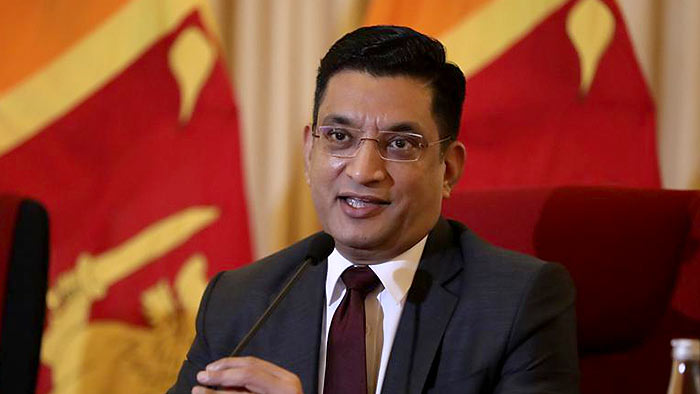UNHRC cannot dictate on economic reforms in Sri Lanka – Foreign Minister

The United Nations Human Rights Council (UNHRC) does not have the expert knowledge or mandate to dictate terms on economic reforms to Sri Lanka, Foreign Affairs Minister Ali Sabry, PC stressed.
The Minister, however, acknowledged that Sri Lanka needs economic reforms and that alleged economic losses must be investigated within the country’s laws. Joining in a media conference via Zoom yesterday while attending the 51st Session of the UNHRC in Geneva, Switzerland, Sabry said the Government is working with the International Monetary Fund (IMF) and other economic specialists on economic matters and the UNHRC’s involvement on that aspect is an uncalled-for interference.
The 47-Member UNHRC will take up the vote on the fresh Resolution on Sri Lanka presented by the Co-Group led by the United Kingdom (UK), Canada, Germany and the United States of America (USA) today. It has been co-sponsored by 30 countries.
The Minister, noting that Sri Lanka has expressed its strong opposition to the draft Resolution, however said it would likely be adopted given the composition of the Council and heavy lobbying by powerful countries in the West. He observed the number of votes against the Resolution would be significantly less than that of the previous year, as several like-minded countries such as Bangladesh, the Philippines and the Maldives have no voting powers this year.
The Minister underlined that the 8th paragraph of the draft Resolution which allows “to collect, consolidate, analyse and preserve information and evidence and to develop possible strategies for future accountability processes, to support relevant judicial and other proceedings, including in Member States, with competent jurisdiction,” is dangerous because it allows other countries to initiate legal action against Sri Lankan military personnel and other individuals against whom there are human rights violation charges.
“Taking up those cases in the courts of foreign countries or allowing foreign judges to Sri Lanka is against Sri Lanka’s Constitution. We cannot agree to any such mechanism. Whatever the outcome, we stand by this position in order to protect the country’s territorial integrity, stability and independence,” he reiterated.
The Minister complained that Sri Lanka did not get due international credit for its progressive actions like returning 94 per cent of the military-held lands to civilian owners, rehabilitation and reintegration of more than 12,000 former LTTE cadres, releasing Tamils who were detained under Prevention of Terrorism Act (PTA), payments for war-victims through the Office of Reparations and the proposed 22nd Amendment to the Constitution.
“By continuously keeping Sri Lanka in the UNHRC agenda, the Western countries are trying to use human rights as a tool to pressure and control our country to advance their polarised and political objectives. The Diaspora groups in those countries continue to add pressure all the time,” the Minister remarked.
The Minister, however, highlighted that Sri Lanka needs to establish a Truth Seeking Mechanism of its own following the footsteps of South Africa’s Truth and Reconciliation Commission. “We have to admit that we have made little progress on that aspect. It has to be accelerated, and it is our responsibility on behalf of our own people,” he commented. He also pointed out the importance of a Diaspora Secretariat to connect with the Diaspora Community and take their contributions for the country’s development.
Sri Lanka’s Permanent Representative to the United Nations Office at Geneva, C. A. Chandraprema, also joined in the press conference.
(Source: Daily News – By Disna Mudalige)
Latest Headlines in Sri Lanka
- Anusha Palpita remanded until February 6, 2026 January 23, 2026
- Anusha Palpita arrested by Bribery Commission January 23, 2026
- Johnston Fernando, two sons and others further remanded until January 30, 2026 January 23, 2026
- Paranthan Chemical Factory reconstruction begins after four decades January 23, 2026
- Sri Lanka hospitals affected as GMOA starts 48 hour strike January 23, 2026



UNHRC does not have the expert knowledge or mandate to dictate terms on economic reforms to Sri Lanka. Spot on Minister Ali Sabry!